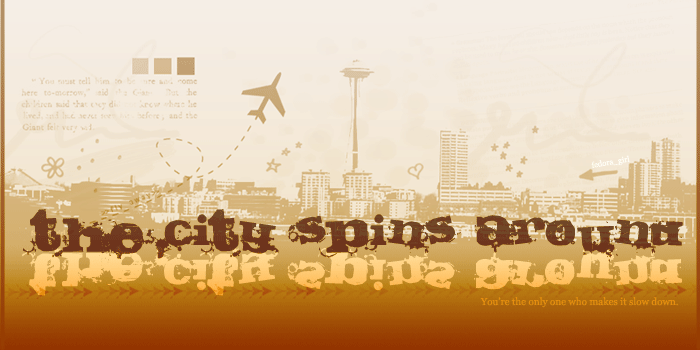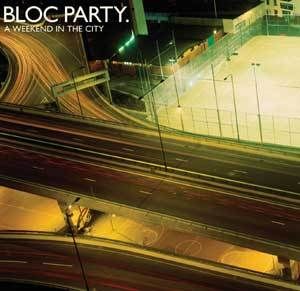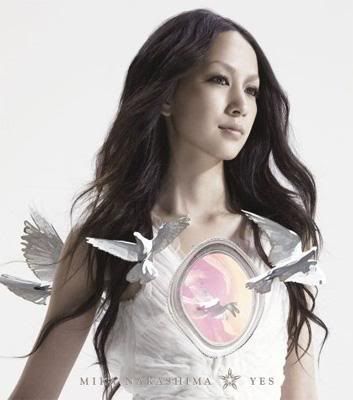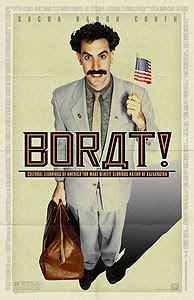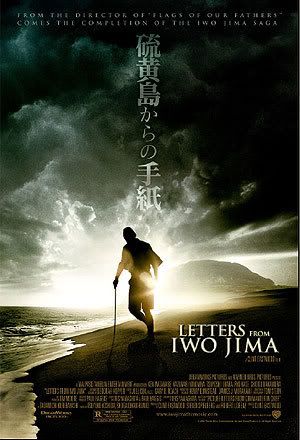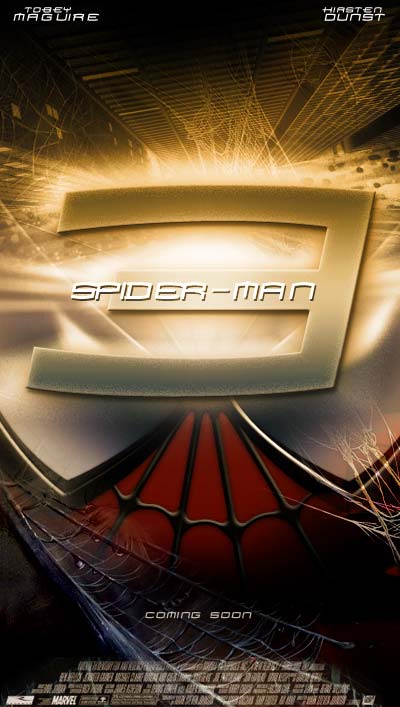Thursday, April 27, 2006
Espousing Political Lines
Yesterday, in the Nationbuilder Times, I read an article that kinda raised the hairs on the back of my neck. The journalist, like a little girl meeting ________ (fill in name of your favourite movie star) for the first time, was writing about our esteemed PM. Here's what that person wrote:
Born son of Mr Lee Kuan Yew, formidable lawyer and cross-examiner, founding father of Singapore. Husband to Madam Ho Ching, formidable former civil servant, now leading force behind Temasek's overseas investment drives. Educated, with numerous academic distinctions, at prestigious Cambridge and Harvard. Speaks five languages. While at school in his younger days, was editor of the school magazine, part of the school debate team, and a drum major and clarinet player.
Now Prime Minister to four million people of all races, languages and religions, ages and aspirations.
Mr Lee Hsien Loong, a Member of Parliament for 22 years and Prime Minister for 20 months, has one of those CVs which people love to hate, especially people not well-disposed towards the au thoritarian political beliefs of his father.
It is not surprising then, that unlike the 1991 election when the then new prime minister Goh Chok Tong made himself and his style of government a key election platform, this new prime minister is steering clear of the personal, and keeping to broader issues of policy and party deliverables.
His emphasis is on actions, not words. He shows you he wants to build further on a proven track record, and not be a short-term wonder making empty promises.
As he told this newspaper, he is entering the election 'not just as a face and a promise', but with a set of concrete policies already set in motion. Some examples he cited are the ComCare fund for needy Singaporeans, and the Workfare scheme for the low-income.
In any case, the general election will not turn on his popularity or otherwise. His own megawatt smile notwithstanding - Newsweek once hailed him as 'Singapore's sunny face' - one probably needs to be as popular as Taufik Batisah or even Tom Cruise before popularity has any impact on voting patterns.
Having said all that however, whether he likes it or not, the Prime Minister - who he is, what he stands for - will still have an indirect and very subtle impact on how people vote, and that's probably why he's been giving so many interviews to the press in recent days.
Most of the descriptions of Mr Lee when he first entered politics still hold, for instance that he is 'smart, efficient and blunt'. But new ones have been added over the years as Singaporeans got to see other aspects of him. Today, the image that is in voters' minds is that of someone a lot more in touch with the ordinary citizen, someone strong but reasonable, hard-headed yet humane.
At last year's National Day Rally, Singaporeans caught a glimpse of the inner man when emotions almost overwhelmed him at two points in the rally speech. One was when he recalled how, despite pouring rain during the National Day Parade of 1968, it was decided that the show must go on. The other was when he brought the address to a rousing close, declaring, 'We've created a Singapore spirit. We're courageous but compassionate, we're confident, never complacent. It's a spirit which will hold us together as one united people, each one contributing to remaking our nation'.
All Singapore prime ministers must be patriots and nationalists, but this one is probably more so - he, after all, started attending political rallies with his father in 1963, when he was just 11.
For myself, what stands out is that he is one of those rare characters with 'sympathy', not in the ordinary sense of specific sympathy for specific individuals, but a more universal power, defined in the American Heritage Dictionary as the act or power of sharing the feelings of another.
Whether innate or developed through years of caring for a son with Asperger's Syndrome, or some other reason, that special faculty is there and perhaps explains why his grassroots helpers in Teck Ghee constituency root so strongly for him.
This is not to say that the PM is a softie or a political liberal. Those who saw in his famous Harvard Club speech, in January 2004 before he became prime minister, signs of a major political liberalisation read too much into the tea leaves. Where he does liberalise it will be for pragmatic and not for ideological reasons per se. It will be because liberalisation is necessary for Singapore's progress - because the 5 or 6 per cent of Singaporeans for whom political liberalisation matters also counts among them some of the country's future political leaders and opinion shapers.
And as the legal action taken against the Singapore Democratic Party last Friday showed, this is a man who can play hardball too, like his father.
He plays hardball however with a long straight drive, with an internal coherence or consistency almost impossible to fault. There are some pundits out there who delight in spotting and highlighting inconsistencies in what politicians say. It would probably be very difficult to find anything inconsistent in what Mr Lee has said over the years. I tried, but failed.
For instance, when he commented on the economy in an interview with this newspaper two days ago, he did so without glossing over the problems ahead. No attempt to electioneer, no gloating reminders of how well the Government has done. Just this: 'The economy may have grown 6 point something per cent last year, but I think we will have the growth with a lot of effort and with a lot more social adjustments which are going to be necessary.'
But while Mr Lee might be a straight arrow, on social issues his directness has been moderated by experience and the necessities of politics. As an older Singaporean noted, 'he responds with moderation' today to most things: 'I would not have expected that of him when he first entered politics.'
His remarks on the young probably regained some ground lost in the wake of Minister Mentor Lee Kuan Yew's dialogue with 10 young Singaporeans. Where the older Lee reproved the 'radical, English-educated young' for forgetting the hardships Singapore faced in its path to modernity, the younger Lee rather more phlegmatically said that 'it's nobody's fault'.
'We, the older generation, worked very hard to make sure there was a peaceful environment in which they can bring up children. But as a result we tend to forget how unique and how precious this is. It's normal.'
Sweet words for most Singaporeans: 'It's normal.' It is this understanding of - and sympathy with - normal Singaporeans which will stand the new PM in good stead in the coming election.
Not too long ago, the "espousing of political lines" was banned on blogs and podcasts...but I guess it's alright to do so on newspapers because they're not blogs or podcasts, just some sheets of paper used to wrap vegetables in the wet market.
Born son of Mr Lee Kuan Yew, formidable lawyer and cross-examiner, founding father of Singapore. Husband to Madam Ho Ching, formidable former civil servant, now leading force behind Temasek's overseas investment drives. Educated, with numerous academic distinctions, at prestigious Cambridge and Harvard. Speaks five languages. While at school in his younger days, was editor of the school magazine, part of the school debate team, and a drum major and clarinet player.
Now Prime Minister to four million people of all races, languages and religions, ages and aspirations.
Mr Lee Hsien Loong, a Member of Parliament for 22 years and Prime Minister for 20 months, has one of those CVs which people love to hate, especially people not well-disposed towards the au thoritarian political beliefs of his father.
It is not surprising then, that unlike the 1991 election when the then new prime minister Goh Chok Tong made himself and his style of government a key election platform, this new prime minister is steering clear of the personal, and keeping to broader issues of policy and party deliverables.
His emphasis is on actions, not words. He shows you he wants to build further on a proven track record, and not be a short-term wonder making empty promises.
As he told this newspaper, he is entering the election 'not just as a face and a promise', but with a set of concrete policies already set in motion. Some examples he cited are the ComCare fund for needy Singaporeans, and the Workfare scheme for the low-income.
In any case, the general election will not turn on his popularity or otherwise. His own megawatt smile notwithstanding - Newsweek once hailed him as 'Singapore's sunny face' - one probably needs to be as popular as Taufik Batisah or even Tom Cruise before popularity has any impact on voting patterns.
Having said all that however, whether he likes it or not, the Prime Minister - who he is, what he stands for - will still have an indirect and very subtle impact on how people vote, and that's probably why he's been giving so many interviews to the press in recent days.
Most of the descriptions of Mr Lee when he first entered politics still hold, for instance that he is 'smart, efficient and blunt'. But new ones have been added over the years as Singaporeans got to see other aspects of him. Today, the image that is in voters' minds is that of someone a lot more in touch with the ordinary citizen, someone strong but reasonable, hard-headed yet humane.
At last year's National Day Rally, Singaporeans caught a glimpse of the inner man when emotions almost overwhelmed him at two points in the rally speech. One was when he recalled how, despite pouring rain during the National Day Parade of 1968, it was decided that the show must go on. The other was when he brought the address to a rousing close, declaring, 'We've created a Singapore spirit. We're courageous but compassionate, we're confident, never complacent. It's a spirit which will hold us together as one united people, each one contributing to remaking our nation'.
All Singapore prime ministers must be patriots and nationalists, but this one is probably more so - he, after all, started attending political rallies with his father in 1963, when he was just 11.
For myself, what stands out is that he is one of those rare characters with 'sympathy', not in the ordinary sense of specific sympathy for specific individuals, but a more universal power, defined in the American Heritage Dictionary as the act or power of sharing the feelings of another.
Whether innate or developed through years of caring for a son with Asperger's Syndrome, or some other reason, that special faculty is there and perhaps explains why his grassroots helpers in Teck Ghee constituency root so strongly for him.
This is not to say that the PM is a softie or a political liberal. Those who saw in his famous Harvard Club speech, in January 2004 before he became prime minister, signs of a major political liberalisation read too much into the tea leaves. Where he does liberalise it will be for pragmatic and not for ideological reasons per se. It will be because liberalisation is necessary for Singapore's progress - because the 5 or 6 per cent of Singaporeans for whom political liberalisation matters also counts among them some of the country's future political leaders and opinion shapers.
And as the legal action taken against the Singapore Democratic Party last Friday showed, this is a man who can play hardball too, like his father.
He plays hardball however with a long straight drive, with an internal coherence or consistency almost impossible to fault. There are some pundits out there who delight in spotting and highlighting inconsistencies in what politicians say. It would probably be very difficult to find anything inconsistent in what Mr Lee has said over the years. I tried, but failed.
For instance, when he commented on the economy in an interview with this newspaper two days ago, he did so without glossing over the problems ahead. No attempt to electioneer, no gloating reminders of how well the Government has done. Just this: 'The economy may have grown 6 point something per cent last year, but I think we will have the growth with a lot of effort and with a lot more social adjustments which are going to be necessary.'
But while Mr Lee might be a straight arrow, on social issues his directness has been moderated by experience and the necessities of politics. As an older Singaporean noted, 'he responds with moderation' today to most things: 'I would not have expected that of him when he first entered politics.'
His remarks on the young probably regained some ground lost in the wake of Minister Mentor Lee Kuan Yew's dialogue with 10 young Singaporeans. Where the older Lee reproved the 'radical, English-educated young' for forgetting the hardships Singapore faced in its path to modernity, the younger Lee rather more phlegmatically said that 'it's nobody's fault'.
'We, the older generation, worked very hard to make sure there was a peaceful environment in which they can bring up children. But as a result we tend to forget how unique and how precious this is. It's normal.'
Sweet words for most Singaporeans: 'It's normal.' It is this understanding of - and sympathy with - normal Singaporeans which will stand the new PM in good stead in the coming election.
Not too long ago, the "espousing of political lines" was banned on blogs and podcasts...but I guess it's alright to do so on newspapers because they're not blogs or podcasts, just some sheets of paper used to wrap vegetables in the wet market.
PM Lee may be good...but to paint him as almost flawless must be overdoing it...way way overboard.
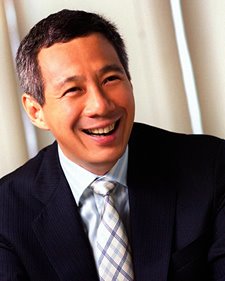 PM Lee: Praised to high heavens.
PM Lee: Praised to high heavens.
Batman spun on 10:27 AM.
